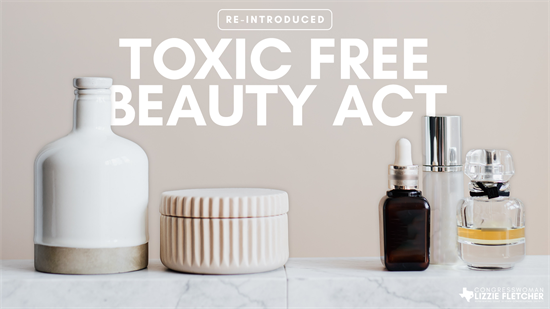Press Releases
Congresswoman Lizzie Fletcher and Congresswoman Jan Schakowsky Reintroduce Legislation To Ban Hazardous Chemicals from Beauty and Personal Care Products
Washington,
July 17, 2025
Today, Congresswoman Lizzie Fletcher (TX-07) and Congresswoman Jan Schakowsky (IL-09) reintroduced the Toxic-Free Beauty Act, which prohibits the use of certain hazardous chemicals from personal and professional care, beauty, and salon products sold in the United States. Some of the chemicals used to create personal and professional care, beauty, and salon products have been linked to serious harm to human health and the environment, but to date, the U.S. Food and Drug Administration (FDA) has only banned or restricted eleven chemicals. Through the Toxic-Free Beauty Act, products containing certain toxic chemicals would be officially considered harmful for consumers by the FDA and result in enforcement against these products, effectively banning the chemicals from use. “Many people assume that the personal care and beauty items they use are safe, but with minimal oversight, many of the care, beauty, and salon products sold across the country actually contain toxic chemicals,” said Congresswoman Lizzie Fletcher. “I am glad to partner with Congresswoman Schakowsky to reintroduce the Toxic-Free Beauty Act to protect the health and safety of people across the country by banning chemicals known to cause significant harm in beauty products.” “Safe, accessible beauty cannot wait. After more than 80 years of inaction, the United States finally updated its cosmetics laws in 2022. President Biden was able to sign into law the Modernization of Cosmetics Regulation Act, which now gives authority to the Food and Drug Administration to recall beauty and personal care products that are harming human health. While this was an important first step, our work is not done,” said Congresswoman Jan Schakowsky. “I am proud to reintroduce the Safer Beauty Bill Package with my colleagues, Reps. Lizzie Fletcher, Doris Matsui, and Ayanna Pressley, which would protect consumers from toxic chemicals linked to hormone disruption, cancer and other health problems; require full ingredient transparency for consumers and manufacturers; and protect the health of women of color and salon workers, who are among the most highly exposed to toxic chemicals because of the products marketed to them or commonly found in their workplaces. We must pass the Safer Beauty Bill Package now!” If enacted, the Toxic-Free Beauty Act would ban the use of the following chemicals in personal and professional beauty, care, and salon products sold in the U.S.:
If enacted, this bill would also ban two classes of chemicals including:
Congresswoman Fletcher and Congresswoman Schakowsky first introduced the Toxic-Free Beauty Act in the 117th Congress and reintroduced it in the 118th Congress. This year, they updated the legislation to add chemicals that several states have already banned. To view full text of the bill, click here. |

